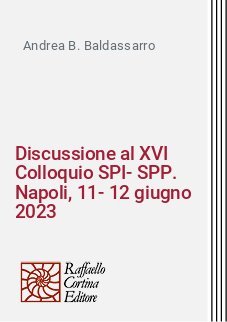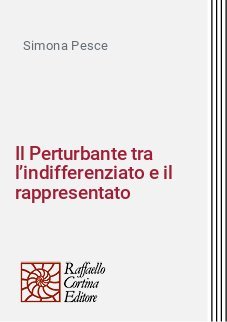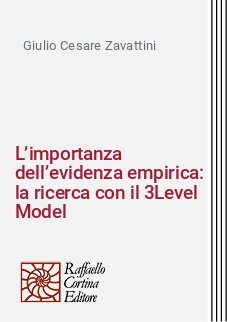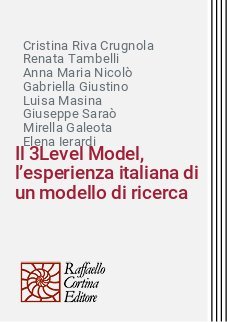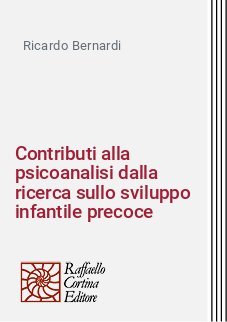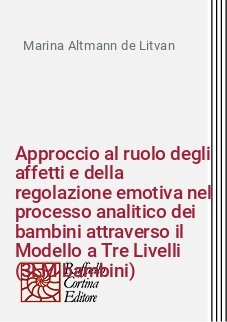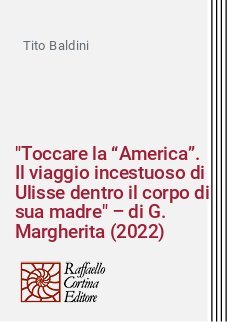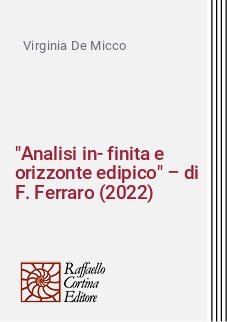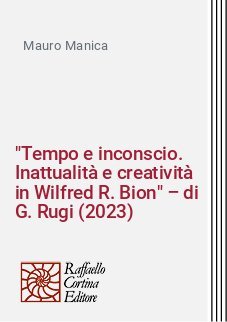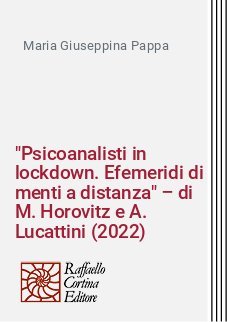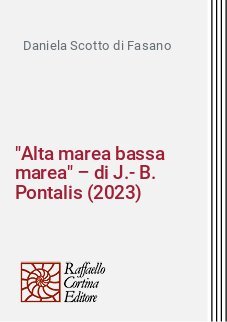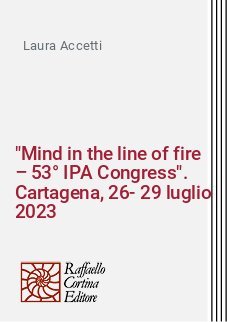Raffaello Cortina Editore
Il 3Level Model, l’esperienza italiana di un modello di ricerca
rivista: La Rivista di Psicoanalisi
fascicolo: Rivista di Psicoanalisi 2023/4
Autori vari
Il 3Level Model, l’esperienza italiana di un modello di ricerca
Il lavoro è un contributo italiano al dialogo scientifico tra psicoanalisi e ricerca. Il 3LM costituisce un modello d’intervisione, che ha il punto di forza nel favorire la molteplicità dell’esperienze dei partecipanti e nel valorizzare la pluralità dei punti di vista. Il 3LM studia il materiale clinico sottoponendolo a una verifica effettuata da più membri del gruppo di lavoro e ad un altro livello effettua un lavoro sulla mente degli analisti nella clinica e sul modo in cui vengono attuati i concetti teorici. I gruppi contribuiscono a creare un clima e un’esperienza finalizzata all’apprendimento, al discutere il caso clinico e lavorare insieme. Nel lavoro viene presentata una scheda di valutazione volta a valutare i cambiamenti del paziente a livello di funzionamento e di relazioni con il terapeuta. I risultati relativi al suo utilizzo hanno evidenziato cambiamenti significativi.
Parole Chiave: Formazione, 3LM, ricerca, scheda di valutazione.
The 3Level Model, the Italian experience of a research model. The paper is an Italian contribution to the scientific dialogue between psychoanalysis and research. The 3LM constitutes a model of intervision, whose strength lies in favouring the multiplicity of participants’ experiences and enhancing the plurality of viewpoints. The 3LM studies the clinical material by subjecting it to scrutiny by several group members and at another level carries out work on the analysts’ minds in the clinic and the way theoretical concepts are implemented. The groups help to create a climate and experience aimed at learning, discussing the clinical case and working together. An evaluation form is presented in the paper to assess changes in the patient’s functioning and relationship with the therapist. The results of its use showed significant changes.
Key Words: Evaluation form, 3LM, research, training.
Le 3Level Model, l’expérience italienne d’un modèle de recherche. L’ouvrage est une contribution italienne au dialogue scientifique entre psychanalyse et recherche. Le 3-LM constituent un modèle d’intervision, qui a la force de favoriser la multiplicité des expériences des participants et de valoriser la pluralité des points de vue. Le 3LM étudie le matériel clinique en le soumettant à une vérification effectuée par plusieurs membres du groupe de travail et à un autre niveau il réalise un travail sur l’esprit des analystes de la clinique et sur la manière dont les concepts théoriques sont mis en œuvre. Les groupes contribuent à créer un climat et une expérience visant à apprendre, à discuter du cas clinique et à travailler ensemble. L’ouvrage présente une forme d’évaluation visant à évaluer les changements du fonctionnement et des relations du patient avec le thérapeute. Les résultats relatifs à son utilisation ont mis en évidence des changements significatifs.
Mots-Clés: Fiche d’évaluation, formation, recherche, 3LM.
El Modelo 3Level, la experiencia italiana de un modelo de investigación. El trabajo es una contribución italiana al diálogo científico entre psicoanálisis e investigación. El 3LM constituye un modelo de intervisión, que tiene la fuerza de favorecer la multiplicidad de experiencias de los participantes y potenciar la pluralidad de puntos de vista. El 3LM estudia el material clínico sometiéndolo a una verificación realizada por varios miembros del grupo de trabajo y en otro nivel realiza un trabajo sobre la mente de los analistas en la clínica y sobre la forma en que se implementan los conceptos teóricos. Los grupos ayudan a crear un clima y una experiencia encaminada a aprender, discutir el caso clínico y trabajar juntos. El trabajo presenta un formulario de evaluación destinado a evaluar los cambios del paciente en el funcionamiento y las relaciones con el terapeuta. Los resultados relacionados con su uso han puesto de relieve cambios significativos.
Palabras Clave: Formación, investigación, formulario de evaluación, 3LM.
Das Three-Level Model: die italienische Erfahrung mit einem Forschungsmodell. Die Arbeit ist ein italienischer Beitrag zum wissenschaftlichen Dialog zwischen Psychoanalyse und Forschung. Das 3-LM stellt ein Modell der Intervision dar, dessen Stärke darin besteht, die Vielfalt der Erfahrungen der Teilnehmenden zu unterstützen, und die Pluralität der Perspektiven hervorzuheben. Das 3-LM untersucht das klinische Material, indem es dieses einer durch mehrere Mitglieder der Arbeitsgruppe durchgeführten Verifizierung unterzieht, und bewirkt auf einer anderen Ebene eine Arbeit am Geist der Analytiker in der Klinik und an der Art und Weise, wie theoretische Konzepte realisiert werden. Die Gruppen tragen zur Schaffung eines Klimas und einer Erfahrung bei, die auf Lernen, Diskussion des klinischen Falls und Zusammenarbeit ausgerichtet sind. In der Arbeit wird ein Evaluationsbogen für die Bewertung der Veränderungen des Patienten auf der Ebene des Funktionierens sowie der Beziehung zum Therapeuten vorgestellt. Die Ergebnisse bezüglich seiner Anwendungzeigten signifikante Veränderungen.
Schlüsselwörter: Ausbildung, Evaluationsbogen, Forschung, 3-LM.
Contributi alla psicoanalisi dalla ricerca sullo sviluppo infantile precoce
rivista: La Rivista di Psicoanalisi
fascicolo: Rivista di Psicoanalisi 2023/4
di Ricardo Bernardi
Contributi alla psicoanalisi dalla ricerca sullo sviluppo infantile precoce
La ricerca empirica sullo sviluppo infantile precoce ha dato un contributo significativo alla comprensione psicoanalitica non solo dei processi intersoggettivi che avvengono tra il bambino e la madre o i caregiver, ma anche tra il paziente e l’analista. Questo contributo mostra la necessità di combinare l’atteggiamento di rêverie e di comprensione empatica con un «secondo sguardo» critico che esamini la complessità dei fenomeni intersoggettivi da molteplici prospettive (M. e W. Baranger). Questo articolo esamina il «terzo sguardo» sull’intersoggettività che emerge nei gruppi di discussione clinica basati sul «Modello a tre livelli per l’osservazione delle trasformazioni del paziente» (3-LM) come risultato dell’intreccio di molteplici prospettive personali durante la discussione di materiale clinico proveniente da lunghi periodi di analisi.
Parole chiave: Interazione, intersoggettività, modello a tre livelli (3-lm), ricerca clinica, sincronie, sviluppo infantile precoce.
Contributions to psychoanalysis from research on early child development. Empirical research on early child development has made a significant contribution to psychoanalytic understanding not only of the intersubjective processes occurring between the child and mother or caregivers, but also between the patient and the analyst. This contribution shows the need to combine the attitude of reverie and empathic understanding with a critical «second look» that examines the complexity of intersubjective phenomena from multiple perspectives (M. and W. Baranger). This article examines the «third look» at intersubjectivity that emerges in clinical discussion groups based on the «Three Level Model for Observing Patient Transformations» (3-LM) as a result of the interweaving of multiple personal perspectives during the discussion of clinical material from long periods of analysis.
Keywords: Clinical research, early child development, interaction, intersubjectivity, synchronies, three-level model (3-LM).
Contributions à la psychanalyse de la recherche sur le développement de la petite enfance. La recherche empirique sur le développement de la petite enfance a apporté une contribution significative à la compréhension psychanalytique non seulement des processus intersubjectifs qui se produisent entre l’enfant et la mère ou les soignants, mais aussi entre le patient et l’analyste. Cette contribution montre la nécessité de combiner l’attitude de rêverie et de compréhension empathique avec un «second regard» critique qui examine la complexité des phénomènes intersubjectifs sous de multiples perspectives (M. et W. Baranger). Cet article examine le «troisième regard» sur l’intersubjectivité qui émerge dans les groupes de discussion clinique basé sur le «Modèle à trois niveaux pour observer les transformations des patients» (3-LM) à la suite de l’entrelacement de multiples perspectives personnelles lors de la discussion du matériel clinique. issus de longues périodes d’analyse.
Mots Clés: Interaction, intersubjectivité, modèle à trois niveaux (3-LM), recherche clinique, synchronies, développement de la petite enfance.
Aportes al psicoanálisis desde las investigaciones sobre el desarrollo infantil temprano. La investigación empírica sobre el desarrollo infantil temprano ha dado un aporte significativo a la comprensión psicoanalítica no sólo de los procesos intersubjetivos que ocurren entre el niño y la madre o caregiver, sino también entre el paciente y el analista. Este contribución muestra la necesidad de combinar la actitud derêverie y comprensión empática con una «segunda mirada» crítica que examine la complejidad de los fenómenos intersubjetivos desde múltiples perspectivas (M. y W. Baranger). Este artículo explora la «tercera mirada» sobre la intersubjetividad que emerge en los grupos de discusión clínica a partir del «Modelo de tres niveles para observar las transformaciones del paciente» (3-LM) como resultado del entrelazamiento de múltiples perspectivas personales durante la discusión del material clínico. provenientes de largos períodos de análisis.
Palabras Clave: Desarrollo infantil temprano, investigación clínica, interacción, intersubjetividad, modelo de tres niveles (3-lm), sincronías.
Beiträge zu einer Psychoanalyse der Erforschung der frühkindlichen Entwicklung. Die empirische Forschung zur frühkindlichen Entwicklung hat einen signifikanten Beitrag zum psychoanalytischen Verständnis nicht nur der intersubjektiven Prozesse, die zwischen Kind und Mutter oder Caregiver geschehen, sondern auch derjenigen zwischen Patient und Analytikergeleistet. Dieser Beitrag zeigt die Notwendigkeit, die Haltung der Rêverie und des empathischen Verstehens mit einem kritischen «zweiten Blick» zu kombinieren, der die Komplexität der intersubjektiven Phänomene aus vielfältigen Perspektiven untersucht (M. und W. Baranger). Dieser Artikel untersucht den «dritten Blick» auf die Intersubjektivität, der sich in klinischen Diskussionsgruppen herausbildet, die auf dem Three-Level Model zur Beobachtung der Veränderungen beim Patienten (3-LM) basieren, als Ergebnis der Verflechtung vielfältiger persönlicher Perspektiven während der Diskussion klinischen Materials, das aus langen Analysezeiträumen stammt.
Schlüsselwörter: Frühkindliche Entwicklung, Interaktion, Intersubjektivität, klinische Forschung, Three-Level Model (3-LM), Synchronien.
Approccio al ruolo degli affetti e della regolazione emotiva nel processo analitico dei bambini attraverso il Modello a Tre Livelli (3LM bambini)
rivista: La Rivista di Psicoanalisi
fascicolo: Rivista di Psicoanalisi 2023/4
di Marina Altmann de Litvan
Approccio al ruolo degli affetti e della regolazione emotiva nel processo analitico dei bambini attraverso il Modello a Tre Livelli (3LM bambini)
Lo scopo di questo articolo è quello di analizzare l’utilità concettuale e clinica dei concetti di regolazione sensoriale e affettiva, derivanti dallo sviluppo della ricerca introdotta dal Modello dei Tre Livelli, per analizzare i cambiamenti nei processi psicoterapeutici dei pazienti bambini. Questo modello in un’istanza di gruppo, permette di ascoltare come è stato l’ascolto dell’analista a livello fenomenologico, a partire da diverse dimensioni dell’analisi e di interrogarci sulla corrispondenza tra le teorie implicite utilizzate e il loro rapporto con le teorie ufficiali, nonché sull’esistenza di altre ipotesi. Le dimensioni includono aspetti che provengono dai risultati della ricerca e da diversi quadri teorici e li riuniscono in modo semplice, attraverso domande, affinché il clinico possa riflettere sul proprio paziente. Ci concentreremo sugli affetti e sulla regolazione sensoriale, esemplificando con un caso.
Parole chiave: Bambini, cambiamento, 3-LM, processo psicoanalitico, regolazione affettiva.
Approaching the role of affect and emotional regulation in the analytical process of children through the Three-Level Model (3LM children). The aim of this article is to analyse the conceptual and clinical usefulness of the concepts of sensory and affective regulation, derived from the development of research introduced by the Three Levels Model, to analyse changes in the psychotherapeutic processes of child patients. This model, in a group instance, allows us to listen to what it was like to listen to the analyst on a phenomenological level, from different dimensions of the analysis and to question the correspondence between the implicit theories used and their relationship to the official theories, as well as the existence of other hypotheses. The dimensions include aspects from research findings and different theoretical frameworks and bring them together in a simple way, through questions, so that the clinician can reflect on his or her patient. We will focus on affect and sensory regulation, exemplifying with a case.
Key words: Affective regulation, change, children, 3-LM, psychoanalytic process.
Approche du rôle des affects et de la régulation émotionnelle dans le processus analytique des enfants à travers le Modèle à Trois Niveaux (enfants 3LM). Le but de cet article est d’analyser l’utilité conceptuelle et clinique des concepts de régulation sensorielle et affective, issus du développement de la recherche introduite par le Modèle à Trois Niveaux, pour analyser les changements dans les processus psychothérapeutiques des enfants patients. Ce modèle en instance de groupe permet d’écouter ce que l’analyste écoutait sur un plan phénoménologique, à partir de différentes dimensions de l’analyse et de s’interroger sur la correspondance entre les théories implicites utilisées et leur rapport avec les théories officielles, comme ainsi que sur l’existence d’autres hypothèses. Les dimensions incluent des aspects issus des résultats de la recherche et de différents cadres théoriques et les rassemblent de manière simple, à travers des questions, afin que le clinicien puisse réfléchir sur son patient. Nous nous concentrerons sur les affects et la régulation sensorielle, en illustrant un cas.
Mots Clés: Changement, Enfants, processus psychanalytique, régulation affective, 3-LM.
Aproximación al papel de los afectos y la regulación emocional en el proceso analítico de niños a través del Modelo de los Tres Niveles (3LM niños).El propósito de este artículo es analizar la utilidad conceptual y clínica de los conceptos de regulación sensorial y afectiva provenientes de la investigación en desarrollo que introduce el Modelo de los Tres Niveles para analizar cambios o no cambios en procesos psicoterapéuticos de los pacientes niños. Este modelo, en su segundo nivel incluye dimensiones que tienen en cuenta aspectos que vienen de resultados de la investigación en desarrollo, así como de distintos marcos teóricos y las acercan de una forma sencilla, a través de distintas preguntas, para que el clínico reflexione sobre su paciente. Nos enfocaremos en las preguntas que propone el modelo sobre los afectos y la regulación sensorial y lo ejemplificaremos con un caso, para luego discutir la relevancia y utilidad de estos conceptos.
Palabras clave: Cambio, niños, 3-LM, proceso psicoanalítico, regulación afectiva.
Annäherung an die Rolle von Affekten und Emotionsregulierung auf den analytischen Prozess von Kindern mithilfe des Three-Level Model. Das Ziel dieses Artikels ist es, den konzeptuellen und klinischen Nutzen von Konzepten sensorischer und affektiver Regulierung zu analysieren, die sich aus der Entwicklung der vom Three-Level Model eingeführten Forschung ableiten, um die Veränderungen in psychotherapeutischen Prozessen von Kinderpatienten zu untersuchen. Dieses Modell erlaubt es, ausgehend von verschiedenen Analyse dimensionen in einer Gruppeninstanz zu hören, wie das Zuhören des Analytikers auf phänomenologischer Ebene war, sowie nach der Übereinstimmung zwischen den angewandten implizierten Theorien und ihrem Verhältnis zu den offiziellen Theorien sowie nach der Existenz anderer Hypothesen zu fragen. Die Dimensionen umfassen Aspekte, die Forschungsergebnissen und verschiedenen theoretischen Rahmen entstammen und diese anhand von Fragen auf einfache Weise vereinen, so dass der Kliniker über den eigenen Patienten nachdenken kann. Wir konzentrieren uns auf die Affekte und die sensorische Regulierung und veranschaulichen anhand eines Falles.
Schlüsselwörter: affektive Regulierung, Kinder, psychoanalytischer Prozess, 3-LM, Veränderung.
 ita
ita
 Eng
Eng


